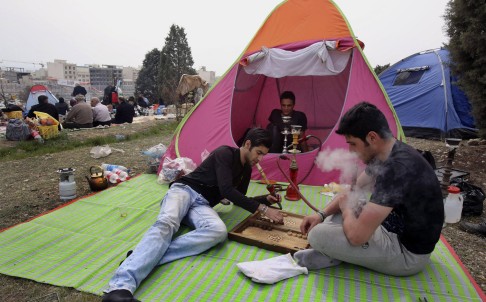Superstitious Iranians enjoy day outdoors to ward off bad luck
Staying indoors is seen as tempting fate on the nation's unluckiest day of the new year
PUBLISHED : Thursday, 03 April, 2014, 10:39pm
UPDATED : Thursday, 03 April, 2014, 10:39pm
Associated Press in Tehran

Backgammon is played in a Tehran park.Photo: AP
Iranians flocked to parks rich with the smell of grilled kebabs to play badminton, chess and backgammon - all to avoid being caught inside on the unlucky 13th day of the Iranian new year.
The annual public picnic day on Wednesday, called Sizdeh Bedar from the Farsi words for "thirteen" and "day out", is a legacy of Iran's pre-Islamic past.
Many say it is bad luck to stay indoors for the holiday.
"I know a family who stayed in and later in the day the leg of their young boy was broken when he fell down the stairs," said Tehran resident Fatemeh Moshiri, 48.
For decades hardliners have tried unsuccessfully to stamp out the festival and other events that are seen as closer to Zoroastrianism, the predominant faith of Iranians before Islam.
"When we go out on Sizdeh Bedar, we take ill omens out with us," Tehran resident Marzieh Rahimim, 64, said. "Otherwise a quarrel may happen or an invaluable dish may be broken."
Last week, Ayatollah Ahmad Khatami, a Friday prayer leader, reiterated a common clerics' admonition that it is "superstitious" to believe that the 13th day of the new year is unlucky or to think that the popular practice of tying blades of grass together on the day will bring good fortune.
Enjoying nature is commendable, Khatami said, but he said people should nonetheless keep Islamic values in mind because the festival comes a day before Muslims remember the anniversary of the death of the daughter of Prophet Mohammed.
Islam has been dominant for centuries in Iran, but the country's Zoroastrian past has left its mark through festivals and traditions. The number of practicing Zoroastrians today is just a tiny minority of 60,000, out of a population of more than 76 million.
State media and calendar makers choose to call the festival "Nature Day".
Families spread rugs and set up small tents in outdoor areas to mark the holiday. They have lunch, sip cups of tea and munch on pistachios, fruit and sweets. Young and old alike tie blades of grass together in the hope the year will be filled with happiness and prosperity.
Iran follows the Persian solar year, which begins on the first day of spring. It is now the year 1393 in Iran, a date calculated from the migration of the Prophet Mohammed from Mecca to Medina in 622 AD.
